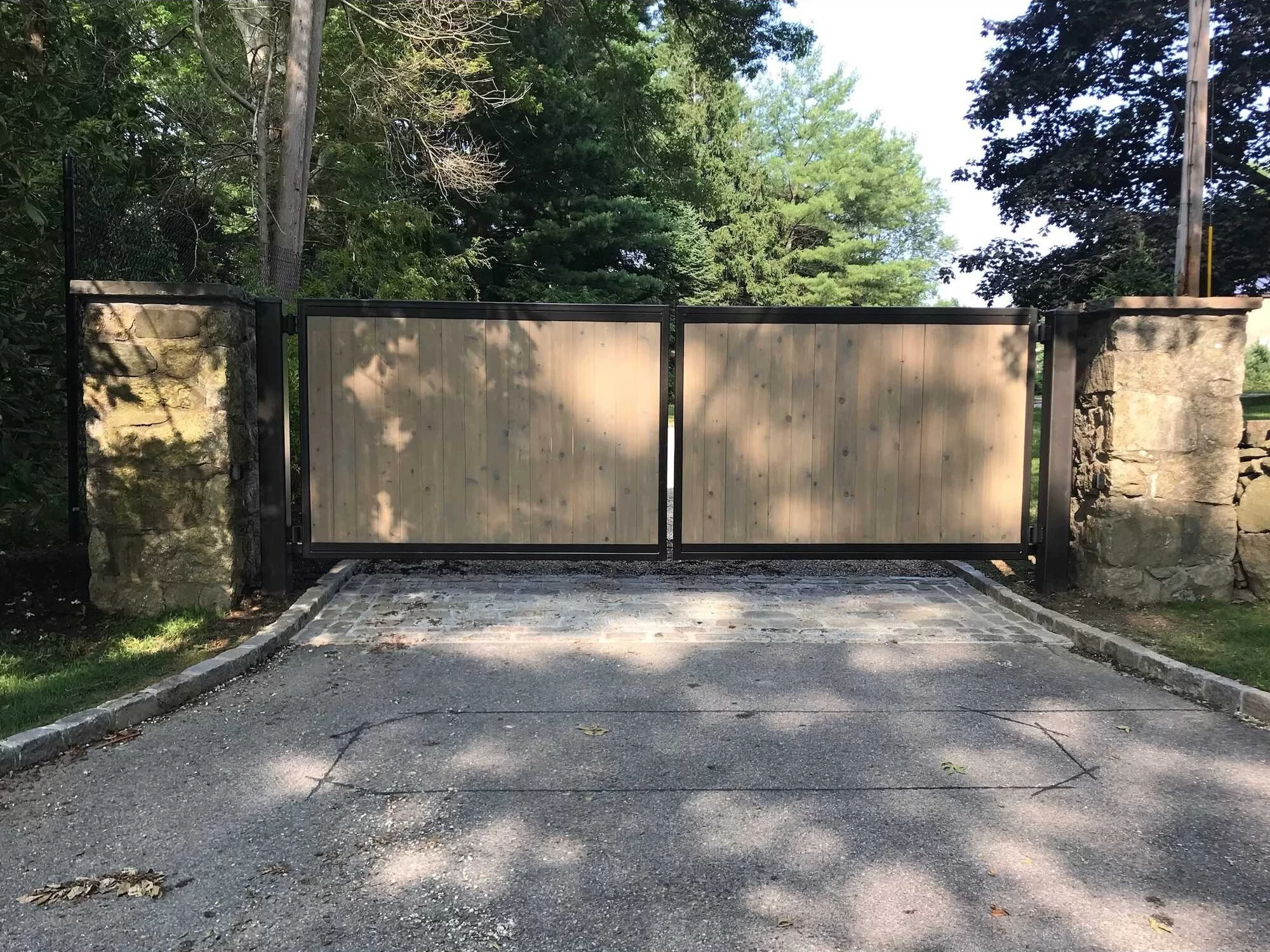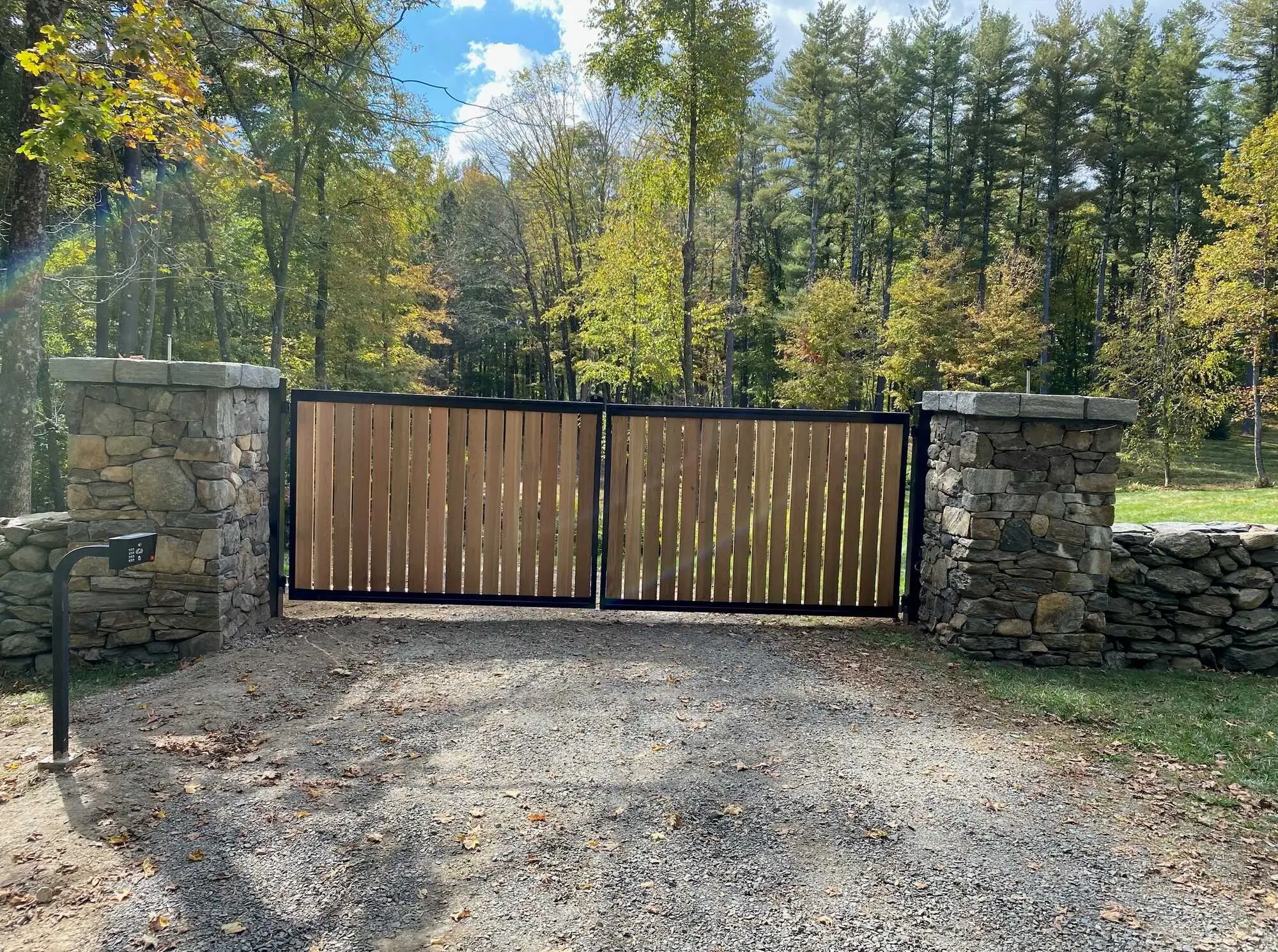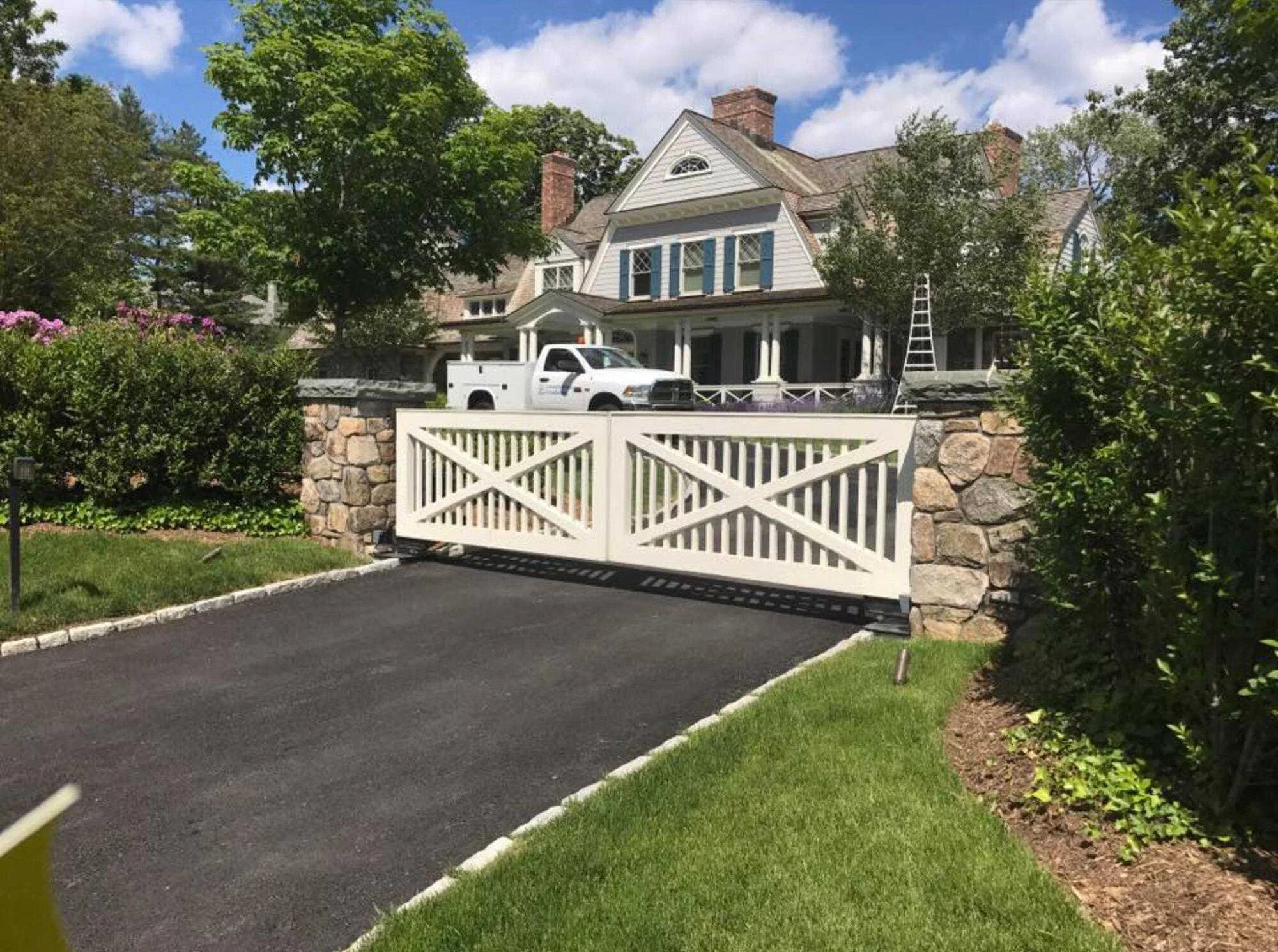Automatic gate installation costs typically range from $2,500 to $5,000 or more, depending on the complexity and features. Benefits include enhanced security and property value, convenience, and improved aesthetics. When getting an installation, expect a professional assessment of your needs, multiple quotes, a detailed breakdown of costs for the opener, gate materials, and labor, and the possibility of ongoing maintenance needs.
Table of Contents
Key Takeaways
|
✔ Quality installation, material choice, and design complexity all play major roles in how much an automatic gate system costs overall. ✔ Automatic gates improve security, add convenience, and boost property value while providing modern, easy access control. ✔ Working with a professional installer ensures the right gate design, transparent pricing, and reliable performance from start to finish. ✔ Installing automatic gates can raise a property’s value by enhancing security, appearance, and overall curb appeal. ✔ Most areas require permits before adding or automating a gate, so checking local rules helps avoid installation delays. ✔ Sliding gates are ideal for tight spaces, while swinging gates work best on flat, open driveways for a classic look. |
5 Factors That Affect the Costs of Automatic Gates
The total cost of electric gate installation can vary depending on several important details. Knowing these factors helps property owners make better choices before hiring a gate contractor or automatic gate installer.
1. Overall Installation
The overall setup cost depends on whether the gate is manual or automated. Automated gates usually require extra components, electrical work, and setup time. A gate installation company considers the size of the property, gate type, and terrain before finalizing the installation plan. Larger or more advanced commercial gate installation projects often need stronger systems, added security, and special configurations handled by professional gate installers.
2. Automatic Gate Opener
The gate opener is the device that powers the automation. Its cost depends on the gate’s design, how often it’s used, and the type of mechanism—swinging, sliding, or lifting. A qualified automatic gate installer will recommend an opener that fits the property’s layout and ensures smooth, long-lasting performance. The opener’s power and technology level play a big role in the total installation cost.
3. Installation Fees
Labor and setup fees differ depending on the project’s difficulty and location. Professional installers manage electrical connections, motor mounting, and safety testing. Hiring a skilled gate contractor ensures everything is done safely, efficiently, and according to local standards. This professional approach helps prevent issues later and ensures the gate operates properly for years to come.
4. Materials
The type of material chosen for the gate affects durability, maintenance, and cost. Common materials include:
- Steel or Wrought Iron: Strong and secure, ideal for long-term protection.
- Aluminum: Lightweight and rust-resistant, perfect for modern styles.
- Wood: Warm and natural in appearance but needs regular upkeep.
- Vinyl: Low-maintenance and versatile, though less sturdy.
A dependable fence company can help match materials to the property’s style and ensure the gate blends seamlessly with existing fences. Choosing quality materials reduces maintenance and increases the lifespan of automatic gates.
5. Additional Features
Extra features make automatic gates more functional and secure but can influence the total investment.
Common Add-ons Include:
- Keypads: For secure, code-based entry.
- Cameras: For visual monitoring and safety.
- Intercom Systems: For speaking with visitors before opening the gate.
A gate installation company can integrate these with smart home systems for easier control and monitoring. Professional gate installers ensure all components work together smoothly, improving both convenience and property security.

4 Benefits of Automatic Gates
Automatic gates offer more than just curb appeal — they add security, convenience, and even property value. Here’s what property owners can expect from a professional electric gate installation:
1. Enhanced Security and Privacy
An automatic gate creates a strong barrier that discourages trespassers and unwanted visitors. This added layer of protection can make homeowners and business owners feel more secure. Automatic gates also give property owners better control over who enters, enhancing both privacy and safety.
2. Convenience
Automation saves time and effort. There’s no need to leave the car to open or close the gate manually — everything can be done with a remote control, keypad, or smartphone app. This convenience makes everyday routines smoother, especially during bad weather or late hours.
3. Safety
In 2024, there were 1,366 property crimes for every 100,000 people, showing how valuable secure access systems have become. Modern automatic gates now include motion sensors and automatic stops to prevent accidents, ensuring they don’t close on vehicles, children, or pets. A certified gate installation company follows safety standards so each system protects both people and property effectively.
4. Modern Appeal
Automatic systems fit seamlessly into smart home designs. They can sync with mobile apps, alarms, and security cameras for complete control. A commercial gate installation can even integrate with access cards or keypad systems for businesses.
What to Expect with an Automatic Gate Installer
Getting an automatic gate installed is a process that involves planning, assessment, and professional expertise. Here’s what usually happens when hiring gate installers for a project:
1. Professional Assessment
Before any work begins, the automatic gate installer will visit the property to understand its layout, size, and terrain. They’ll identify the best gate type — sliding, swinging, or lifting — and suggest appropriate materials. This assessment helps ensure the system fits both functional needs and style preferences.
2. Multiple Quotes
It’s always smart to get several quotes from different companies. Compare not only the prices but also the experience, product warranties, and customer reviews. A reputable fence company or gate contractor should provide a detailed estimate outlining each part of the project.
3. Detailed Breakdown
Before installation starts, homeowners should receive a full cost breakdown, including:
- Labor charges
- Materials and gate type
- Automation system cost
- Estimated timeline
This transparency helps avoid unexpected expenses and ensures a smooth process.
4. Quality Over Price
Cheaper isn’t always better. While it’s tempting to choose the lowest bid, quality workmanship from a trusted gate installation company ensures the system lasts longer and works properly. Inferior materials or poor installation can lead to frequent repairs and safety risks.
5. Power Outage Preparedness
Most automated gates come with manual release options or backup battery systems. This means the gate can still function during power failures — an important feature for both homeowners and businesses relying on electric gate installation systems.

Can Installing an Automatic Gate Boost Property Value?
Yes, installing automatic gates can increase a property’s resale value by around 5%. They instantly add sophistication and a sense of security that appeals to potential buyers. Real estate agents often note that homes with automated entrances stand out in competitive markets.
A professional automatic gate installer ensures the gate complements the overall design of the property — blending style and function. For commercial properties, a commercial gate installation signals professionalism and commitment to security, which can be a selling point for tenants or partners.
A well-designed and properly maintained gate can make a lasting first impression, improving both the look and perceived value of the property.
Is Permission Required to Add a Gate to an Existing Fence?
In many areas, yes — local authorities may require permits before adding or modifying gates, especially if automation is involved. Regulations can depend on location, property type, and gate height. Homeowners planning to upgrade should check with their local building department or consult a fence company experienced with local codes.
For commercial spaces, commercial gate installation projects usually face stricter regulations, so hiring qualified gate installers is essential for compliance and approval.
Which Type of Gate Offers Better Performance — Sliding or Swinging?
The best type depends on the property’s layout and usage. Both sliding and swinging gates have unique advantages.
1. Sliding Gates
Sliding gates move horizontally along a track and are excellent for properties with limited space behind the entryway.
Advantages:
- Ideal for driveways on slopes or narrow areas.
- Typically more secure against forced entry.
- Suitable for both residential and commercial gate installation projects.
Sliding versions often require a more robust track system and motor, so consulting an automatic gate installer ensures proper installation and alignment.
2. Swinging Gates
Swing gates open inward or outward, similar to traditional doors. They are elegant and fit well in wide, flat driveways.
Advantages:
- More affordable and simpler to install than sliding systems.
- Offer a classic and decorative appearance.
- It can be automated easily by a gate installation company.
However, swinging gates need more clearance space to operate and may not be ideal for steep driveways. A gate contractor can assess which type works best for the terrain and daily use needs.
Frequently Asked Questions (FAQs)
How long does an automatic gate installation take?
Most automatic gate installations take a few days to complete once materials are ready. The timeline depends on the complexity of the project, weather conditions, and whether electrical wiring or concrete work is needed. Professional installers typically provide a clear schedule during the planning stage.
Do automatic gates work during power outages?
Yes, many automatic gates include backup power sources such as batteries or manual release systems. These allow the gate to open and close even when electricity is unavailable. It’s important to ask your installer about emergency options before installation.
What maintenance do automatic gates need?
Automatic gates should be checked regularly to ensure all parts work smoothly. This includes cleaning sensors, lubricating hinges or rollers, and testing safety features. Scheduling periodic professional maintenance helps avoid costly repairs later.
Are automatic gates weather-resistant?
Yes, most automatic gates are built with weather-resistant materials and coatings to handle sun, rain, and temperature changes. However, regular maintenance keeps the system performing well through all seasons. Proper installation and drainage also help prevent damage.
Can automatic gates be customized to match my property?
Yes, automatic gates can be fully customized in size, design, color, and material. Installers can match them to fencing, architecture, or landscape features. Custom designs help improve both appearance and functionality for any type of property.
Get Expert Help Installing Automatic Gates in Litchfield County!
Professional installation makes all the difference when it comes to security and reliability. Connecticut Fence & Gate provides trusted automatic gate solutions across Litchfield County, handling everything from design to full electric gate installation with precision and care. Every project is built for lasting performance, matching each property’s layout and aesthetic. For homes or businesses in Litchfield County looking to improve safety and style, expert installers are ready to deliver dependable results.
Contact Connecticut Fence & Gate today to schedule a free consultation and get started with a custom automatic gate installation!
